NZ music acts whining about how hard it is to make a mark in 2024 might find this piece about the struggle to make our sounds heard internationally from 40 years ago a little bit interesting.
 Los Angeles rock freebie BAM recently ran a feature headed ‘Australians Attack California’. It discussed the current invasion of Australian music in America and, “to a lesser extent, neighbouring New Zealand.”
Los Angeles rock freebie BAM recently ran a feature headed ‘Australians Attack California’. It discussed the current invasion of Australian music in America and, “to a lesser extent, neighbouring New Zealand.”
Manager of a prominent Pasadena FM station Larry Groves had this to say: “It’s not just Australian bands. Music is now much more international in scope. Right now, Australia is particularly hot.”
Then the article proceeded with the usual run-down of Australian talent: Tim Finn, Split Enz, Phil Judd, Monte Video, Sharon O’Neill, Dragon…
Support Witchdoctor’s ongoing mission to bring a wealth of new and historic music interviews, features and reviews to you this month (and all year round) as well as coverage of quality brand new, contemporary NZ and international music. Witchdoctor, entertainment for grownups. Your one-off (or monthly) $5 or $10 donation will support Witchdoctor.co.nz. and help us keep producing quality content. It’s really easy to donate, just click the ‘Become a supporter’ button below.
Rocky Douche has a passion for the selling of New Zealand music. A severely rational, considered, earnest individual, Douche’s concern is to get his point across in the most exacting fashion. His rhyme and reason? He reckons it’s New Zealand’s turn in the music export stakes… with any luck, a little limelight and careful strategy.
Douche has represented New Zealand at the MIDEM world music trade fair at Cannes for the two years this country has partaken in the event, and in a humble way the result of NZ’s appearances there have already been quite staggering.
MIDEM (Marche Internationale du Disque et de l’Edition Musicale) is the major annual international record and publishing market. Seven thousand recording and publishing industry representatives from 60 countries attend. “It is the major jumping-off point of getting exposure for what you’re doing in your own country,” says Douche.
“It’s allowing us to correct a lot of misconceptions about the New Zealand music industry… to make the world aware that we have, per head of population, a very strong talent base which is not being developed correctly.
“We’re sick and tired of having top artists virtually forced to become Australians to further their international career. And we’re determined to set up a system so that they can grow to a level in New Zealand and can use that as a stepping-stone into the international market.”

As many fans of homegrown music are aware, many of the very best of the so-called ‘Australian’ crop of successful artists are actually New Zealanders. Even the Australian Financial Review in 1980 credited NZ groups with pulling Australia’s recording industry out of the doldrums, and in that same year, NZ acts based in Oz earned over $3 million in royalties, all going back to… Australia. The artists were contracted to Australian record companies.
The idea, if you hadn’t guessed, is not to trap artists in NZ, but to create a climate where they can live here and be successful.
The NZ product on show at MIDEM this year got a great reception, particularly bands such as electro-poppers The Body Electric, and Douche’s prodigy Jeff Clarkson (released on his label Toast, through his Marmalade Studios in Wellington).
So what’s the story behind all the publicity ballyhoo over the signing of international deals for NZ bands? I must admit the news that The Body Electric record was to be released in Argentina did not send me into raptures. Argentina?

My cynical indifference is misplaced, however. Argentina may not constitute the $3.7 billion turnover of the American market, but at $120 million it certainly beats New Zealand’s measly $3 million. New Zealand’s small turnover makes it plainly obvious that the local market is not big enough to recoup money spent on quality recordings; hence the absolute necessity to export our top product.
New Zealand’s main, and inherent problem is its small population. Solvable but major problems for the New Zealand music industry are the incredibly high (40 percent) sales tax penalties, and the fact that local product gets little or no radio play.
To make matters worse, it’s incredibly hard for NZ artists to become successful in New Zealand. Groups usually have to go to Australia before they are accepted at home. Catch 22. But, despite what often seems a chronic and insurmountable disadvantage in the world marketplace, Douche is confident:
“I personally feel we have a snowball situation here, and that one thing will lead to another.” But…
“We’ve got to discover, groom and market ‘the difference’. We’ve got to accept that we’re a part of a fashion industry, that tastes are changing all the time, and the American market is the one that we have to aim at.”
He admits that he is unabashedly patriotic, and considers it the duty of any New Zealander involved in any way with NZ music to promote it and nurture it. “We’ve all got a responsibility from musicians’ unions to magazines to radio to start getting a bit nationalistic and doing whatever we can to develop that potential.
‘The things that the New Zealand recording industry could do for the country are quite extensive. Like the film industry, we can help break down this image of New Zealand being lakes and mountains and 60 million sheep. We can show we have a depth of culture, and a fairly harmonious, well-educated and developed society.”
We’re inevitably getting into touchy ground here. For starters, the worth of music depends on personal taste. Which music gets encouraged, taken under industry’s wing? The contemporary music Douche talks of, be sure, is not The Great Unwashed.
“To a certain extent, I believe that what’s been happening through smaller, garage-band type labels, has been detrimental to the international thing, because of the specialist market they’ve developed overseas, particularly in the East Coast of America. That country can be excused for believing that’s all the music that comes out of New Zealand.”
I see his point: there is room in this industry for all things. At the same time, there must be more to life than exporting to America the type of music they’ve already got in abundance. It’s which ‘difference’ is groomed that I’ll be interested in.
Douche’s ideal would be a healthy New Zealand music industry, bands making a decent living wage, with the ability to tour worldwide but the time to rest, write and record (at home), and the opportunity for the music to be heard in lots of different markets. It’s not just a dream.
“It’s a $12 billion a year global market… NZ could certainly do with .001 percent of that market!”
+ This story was original published in TOM magazine, a Wellington arts and entertainment fortnightly, in 1984.














